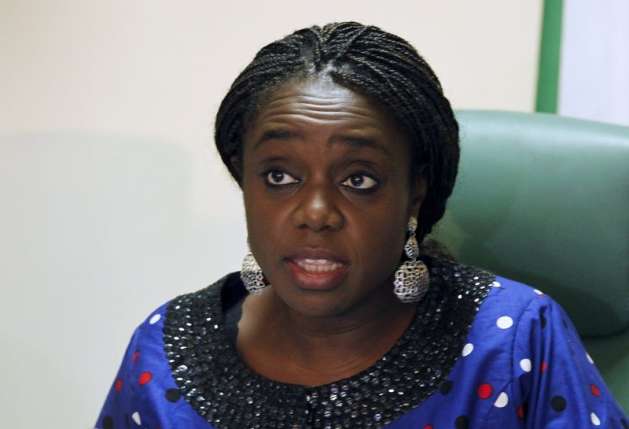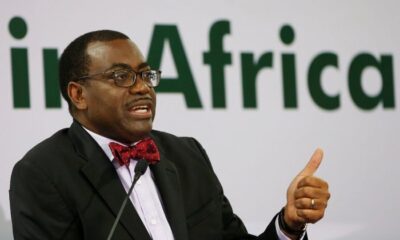Economy
Nigeria in Worst Possible Time – Finance Minister
Published
8 years agoon

Nigeria in Worst Possible Time
The Minister of Finance, Mrs. Kemi Adeosun, on Wednesday admitted that Nigeria was in its worst possible time with the Gross Domestic Product figures for the 2016 second quarter released by the National Bureau of Statistics showing the nation’s economy now in recession.
The nation’s external reserves fell by 2.86 per cent to $25.45bn on August 29, 2016, the latest report from the Central Bank of Nigeria showed on Wednesday. The foreign exchange reserves stood at $26.2bn at the end of July.
The continued scarcity of foreign exchange also pushed the naira to an all-time-low of 420 against the United States dollar at the parallel market.
Adeosun said the nation had a long way to go and the government was not deceiving itself that all was rosy.
She spoke with State House correspondents at the end of a meeting of the Federal Executive Council held inside the Presidential Villa, Abuja.
“It’s the worst possible time for us. Are we confused? Absolutely not,” the minister said.
She identified some of the ways the country could get out of recession to include diversification of the economy and investing in capital projects.
The minister said, “I think that we have a long way to go. We’re not confused and we’re not deceiving ourselves that everything is rosy. It’s not.
“It’s a difficult time for Nigeria but I think Nigeria is in the right hands and if we can stick with our strategy… We still have some adjustments to make. I think we need to make some adjustments in monetary policy.”
In the report released by the NBS, the GDP growth rate slid further from -0.36 per cent in the first quarter to -2.06 per cent.
It also released the capital importation report for the second quarter, the unemployment statistics, the inflation rate for July and the labour productivity report for July.
All the reports painted a negative picture of the Nigerian economy with inflation rising to 17.1 per cent from 16.5 per cent; the unemployment rate increasing to 13.3 per cent from 12.1 per cent and the investment inflows dropping to the lowest levels at $647.1m from $710m.
In terms of the GDP, the negative growth rate recorded in the second quarter of the year is a confirmation of the predictions by the Federal Government and economists that the country was heading for a recession.
A recession is defined as a significant decline in activities across the economy, lasting longer than a few months. It is visible in industrial production, employment, real income and wholesale retail trade.
The technical indicator of a recession is two consecutive quarters of negative economic growth as measured by a country’s GDP.
In nominal terms, the report put the country’s GDP at N23.48tn, adding that this was 2.73 per cent higher than the second quarter of 2015 value of N22.86tn.
The NBS, in the lastest report, said, “In the second quarter of 2016, the nation’s Gross Domestic Product declined by -2.06 per cent (year-on- year) in real terms.
“This was lower by 1.70 percentage points from the growth rate of -0.36 per cent recorded in the preceding quarter, and lower by 4.41 percentage points from the growth rate of 2.35 per cent recorded in the corresponding quarter of 2015. Quarter-on-quarter, the real GDP increased by 0.82 per cent.”
The report stated that most of the sectors recorded huge declines in their GDP growth rates during the second quarter.
Some of them are oil, which recorded a negative GDP growth rate; manufacturing, -1.02 per cent; financial sector, 2.8 per cent; transport, 6.18 per cent; construction, 3.77 per cent; and real estate, 2.12 per cent.
For the manufacturing sector, the report said its drop in the GDP performance was as a result of high operating votes, which impacted negatively on capacity utilisation.
It said, “Nominal GDP growth in manufacturing in the second quarter of 2016 was recorded at negative 1.02 per cent (year- on-year), 1.09 percentage points lower than the 0.07 per cent recorded in the corresponding period of 2015.
“This was partly as a result of higher operating costs related to higher costs of inputs and alternative energy sources. Growth was 1.96 percentage points higher than the first quarter of 2016, when it was 2.98 per cent.”
For the oil sector, the report said the drop in crude oil production, which was caused by the activities of militants, adversely affected the growth of the industry.
It said, “During the period under review, oil production was estimated at 1.69 million barrels per day, 0.42 million barrels per day lower from the production in the first quarter of 2016.
“As a result, real growth in the oil sector was negative 17.48 per cent (year-on-year) in the second quarter of 2016.
“Growth declined by 10.68 percentage points and 15.59 percentage points relative to growth in the second quarter of 2015 and the first quarter of 2016, respectively.”
The report, however, said the financial and insurance sectors grew at 2.80 per cent in nominal terms (year-on-year) in the second quarter.
It added that while the growth rate of financial institutions was insignificant, the insurance industry recorded a growth rate of 19.55 per cent.
For the real estate sector, the report stated that its 2.12 per cent growth was lower by 8.57 percentage points than the growth rate reported for the same period in 2015 and higher by 1.51 percentage points compared to the preceding quarter.
Under the capital importation report, the NBS said that the economy recorded its lowest investment level with a total investment inflow of $647.1m in the second quarter of 2016.
The amount, according to the bureau in the report released by the Statistician General of the Federation, Dr. Yemi Kale, represents a fall of 8.98 per cent, relative to the first quarter.
It added that the decrease was also a decline of 75.73 per cent, relative to the second quarter of 2015.
The report said the continued decline in the value of investment inflows into the economy was symptomatic of the difficult period that the Nigerian economy was going through.
It added, “The second quarter saw the economy enter into the first recession during the rebased period, according to the technical definition of two consecutive periods of decline. This may suggest less profitable opportunities for investment.
“In addition, in the second quarter, there was considerable uncertainty surrounding the future exchange rate policy, which may have deterred investors. The naira was allowed to depreciate towards the end of the quarter. These factors were likely to have contributed to the record decline in capital importation.”
The report said year-on-year, the investment inflows declined for each broad type (foreign direct investment, portfolio investment and other investment).”
Portfolio investment, it noted, recorded the largest decline of 88.76 per cent year-on-year, compared with the declines of 37 per cent and 1.22 per cent for foreign direct and other investments, respectively.
The NBS also said the unemployment rate had risen from 12.1 per cent in the first quarter of this year to 13.3 per cent as of the end of the second quarter.
It said the number of people unemployed or underemployed increased from 24.4 million as of the end of the first quarter to 26.06 million persons.
A further analysis of the report revealed that between the third quarter of last year and the second quarter of this year, the number of those unemployed had risen by 4.5 million.
The report said, “The number of underemployed in the labour force (those working but doing menial jobs not commensurate with their qualifications or those not engaged in fulltime work and merely working for few hours) increased by 392,390 or 2.61 per cent, resulting in an increase in the underemployment rate to 19.3 per cent in Q2 2016 from 19.1 per cent in Q1 2016.
“During the reference period, the number of unemployed in the labour force increased by 1,158,700 persons, resulting in an increase in the national unemployment rate to 13.3 per cent in Q2 2016 from 12.1 in Q1 2016.”
The report also said, “In July, the Consumer Price Index, which measures inflation, increased by 17.1 per cent (year-on-year), 0.6 percentage points higher from the rate recorded in June (16.5 per cent).
“The pace of the increase in the headline index was however weighed upon by a slower increase in three divisions; health, transport and recreation and culture divisions.
“Energy and energy-related prices continue to be the largest increases reflected in the Core sub-index. In July, the Core sub-index increased by 16.9 per cent during the month, up by 0.7 per cent points from rates recorded in June (16.2 per cent).”
Meanwhile, the naira hit an all-time low of 420 against the dollar at the parallel market on Wednesday as dollar shortage continued to weigh on the economy.
The reserves had fallen by 0.4 per cent at the end of July, down from the $26.34bn recorded on June 29.
The foreign exchange reserves stood at $26.42bn on May 28; it was down by 9.2 per cent year-on-year.
The CBN had on June 20 lifted its 16-month-old currency controls and auctioned about $4bn on the spot and futures market to clear a backlog of dollar demand, to help boost interbank market trading.
The global plunge in oil prices has caused the reserves to be depleting very fast. The development has forced the CBN to introduce foreign exchange controls, which were abandoned last month.
But Bureaux de Change operators have raised the hope of a gradual appreciation of the local currency in the near term as the CBN licensed 11 new international money transfer operators to address the dollar supply side.
“Depending on the effective implementation of the central bank’s policy, the appointment of new international money transfer operators will ensure that banks will have more dollars to sell to bureaux de change and provide the needed liquidity in the market,” the President, National Association of Bureaux de Change Operators of Nigeria, Aminu Gwadabe, told Reuters on Wednesday.
The Special Adviser to the President on Economic Matters, Dr. Adeyemi Dipeolu, said the NBS report had also indicated that the second half of the year would be better.
“Besides the growth recorded in the agriculture and solid mineral sectors, the Nigerian economy in response to the policies of the Buhari presidency is also doing better than what the IMF had estimated with clear indications that the second half of the year would be even much better,” he said.
Financial analysts have called on the Federal Government to declare a national emergency on the economy to avoid a situation where the current recession will results in a full blown depression.
Those that spoke to one of our correspondents in separate telephone interviews are a former Managing Director,Unity Bank Plc, Mr. Rislanudeen Muhammed; and the Head, Banking and Finance Department, Nasarawa State University, Keffi, Uche Uwaleke.
Muhammed said the government would have avoided the current economic recession if it had taken the advice given by economists in the earlier part of the year.
He said, “The economy should be under a state of emergency as there is a thin line between either getting the economy out of the current recession and stagflation or slipping and sinking further into depression.”
In his comment, Uwaleke, an associate professor of finance, said said the statistics released by the NBS confirmed the strong correlation between oil revenue and macro economic indicators for an economy largely dependent on the revenue from a single product.
Is the CEO and Founder of Investors King Limited. He is a seasoned foreign exchange research analyst and a published author on Yahoo Finance, Business Insider, Nasdaq, Entrepreneur.com, Investorplace, and other prominent platforms. With over two decades of experience in global financial markets, Olukoya is well-recognized in the industry.

You may like
-
Nigeria Joins BRICS as Partner Country, Strengthening Global South Cooperation
-
70 Million Poorest of The Poor Nigerians To Get N75,000 From FG
-
Nigeria Surpasses OPEC Quota with 1.51 Million bpd, Targets 2.06 Million in 2025
-
Global Investors Commit $7.6 Billion to Nigeria’s Development at AIF 2024
-
Nigeria-China Trade Strengthened as Grimaldi Introduces Direct Shipping Line
-
Nigeria’s GDP Records 3.46% Growth in Q3 Spurred by Non-Oil Sector













